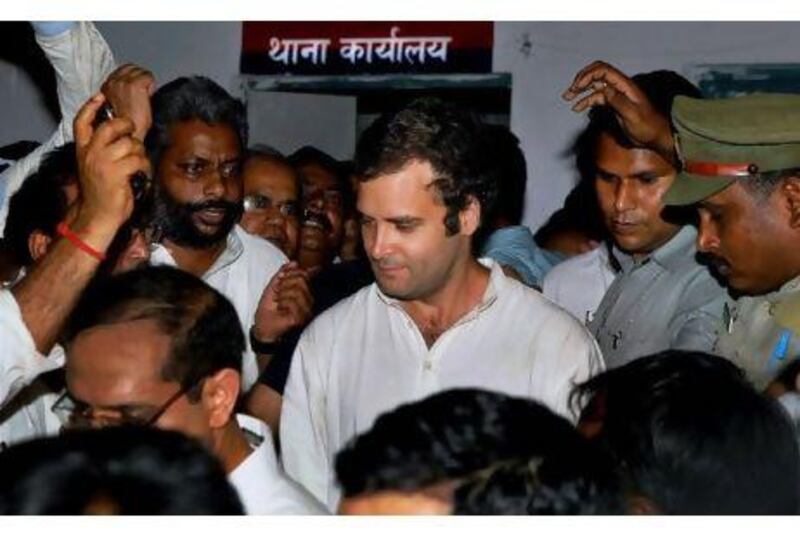NEW DELHI // The political squabbling that followed the arrest of the senior Congress party leader Rahul Gandhi last week, for supporting dissatisfied farmers, has underscored the importance of land issues in India's national dialogue.
Farmers unhappy with the compensation offered by the local government have been protesting for more than three months in Greater Noida, an industrial hub located on the outskirts of New Delhi. They are demanding higher compensation for land acquired in 2009 as part of a $2 billion (Dh7.3bn) government project to build an 165-kilometre expressway between New Delhi and Agra, home to the Taj Mahal.
The protests turned violent last week when farmers and police clashed, leaving three people dead. Soon after, Mayawati, the chief minister of Uttar Pradesh, and her government sought to restrict access to Bhatta and Parsaul, two villages in the Greater Nodia area.
Several political leaders attempting to enter the area were arrested. But it was the detention of Mr Gandhi, 40, the popular scion of the Nehru-Gandhi political dynasty, that launched protest rallies against Ms Mayawati's government.
Mr Gandhi told reporters at the protest site: "I feel ashamed to call myself Indian after seeing what has happened here. The [state] government here has unleashed atrocities on its own people."
Ms Mayawati, a populist, has clashed with the Gandhis and the Congress party in the past.
"He is a yuvraj [prince] no one cares for in the Congress," Ms Mayawati told reporters on Thursday, dismissing Mr Gandhi's participation on Wednesday as political theatre.
Calling it "dirty politics of opposition parties", Ms Mayawati said Mr Gandhi was indulging in "dramatics".
Mr Gandhi's sit-in with the farmers, while largely regarded as symbolic, has helped highlight the plight of farmers as they stand against big business and industrialisation. The issue was largely ignored until a few years ago when India began a push to modernise its sagging infrastructure.
According to the country's land acquisition act, local governments can appropriate farm or forest land for what they consider the public good. Yet what passes for public domain is ambiguous because the purchased land can be reclassified and sold to private companies to build anything from a water bottling factory to a shopping mall.
The legislation that empowers the state and federal government to facilitate development does not properly address farmers' interests, according to experts.
Mahesh Rangarajan, a professor of history at the University of Delhi, said: "There is deep distrust in the peasantry about this issue. They are not unaware. Politically they are very well organised. They are now an important group, but farmers are unequal players. They know full well however much they receive in compensation, the guy next to him who sells his land in the next five years will receive far greater compensation. That is the issue with Greater Noida."
Although the Uttar Pradesh government said that compensation was adequate for the land acquired from the two villages in 2009 - 12 million rupees (Dh 980,000) and 18 million rupees respectively - villagers claim otherwise. It is estimated that acres of land bought for 350,000 rupees (Dh 28,600) by the government was being resold for twice the price by estate agents.
DL Sheth, a sociologist with the Centre for Developing Societies in New Delhi, said: "The farmers feel they were cheated, that they did not receive adequate compensation. Most farmer agitations in the country are connected in that they don't get proper compensation. It is happening in different parts of the country, but the ones that come into focus are the ones where there are firing and deaths. In the long run, one can argue that it can create development in the area but the farmers should not feel cheated."
Ms Mayawati derives a majority of her support from the lower classes or the Dalits, but not from farmers. She is keenly aware that if the farmers' protests were to escalate, the stability of her political party, Bahujan Samaj, could be in jeopardy.
In West Bengal the communist part which ruled the state for more than three decades, lost assembly elections on Friday after the opposition party, the Trinamool Congress, and its leader, Mamata Banerjee, rode to power on a reform agenda with heavy support from farmers.
In March 2007, at least 14 people were killed protesting against a proposed land acquisition in Nandigram, in West Bengal, where the government planned to build chemical factories. The project was abandoned, but the controversy helped Ms Banerjee's reputation as a pro-farmer leader.
Mr Gandhi may be attempting to align himself with farmers in order to gain the same electoral pay-off.
Mr Rangarajan said: "It is a symbolic gesture to get greater response from his [Gandhi's] own party people on this issue. We don't know yet if he has put in much effort. We have to wait and see whether he can sustain it."
sbhattacharya@thenational.ae
* With additional reporting by Reuters





